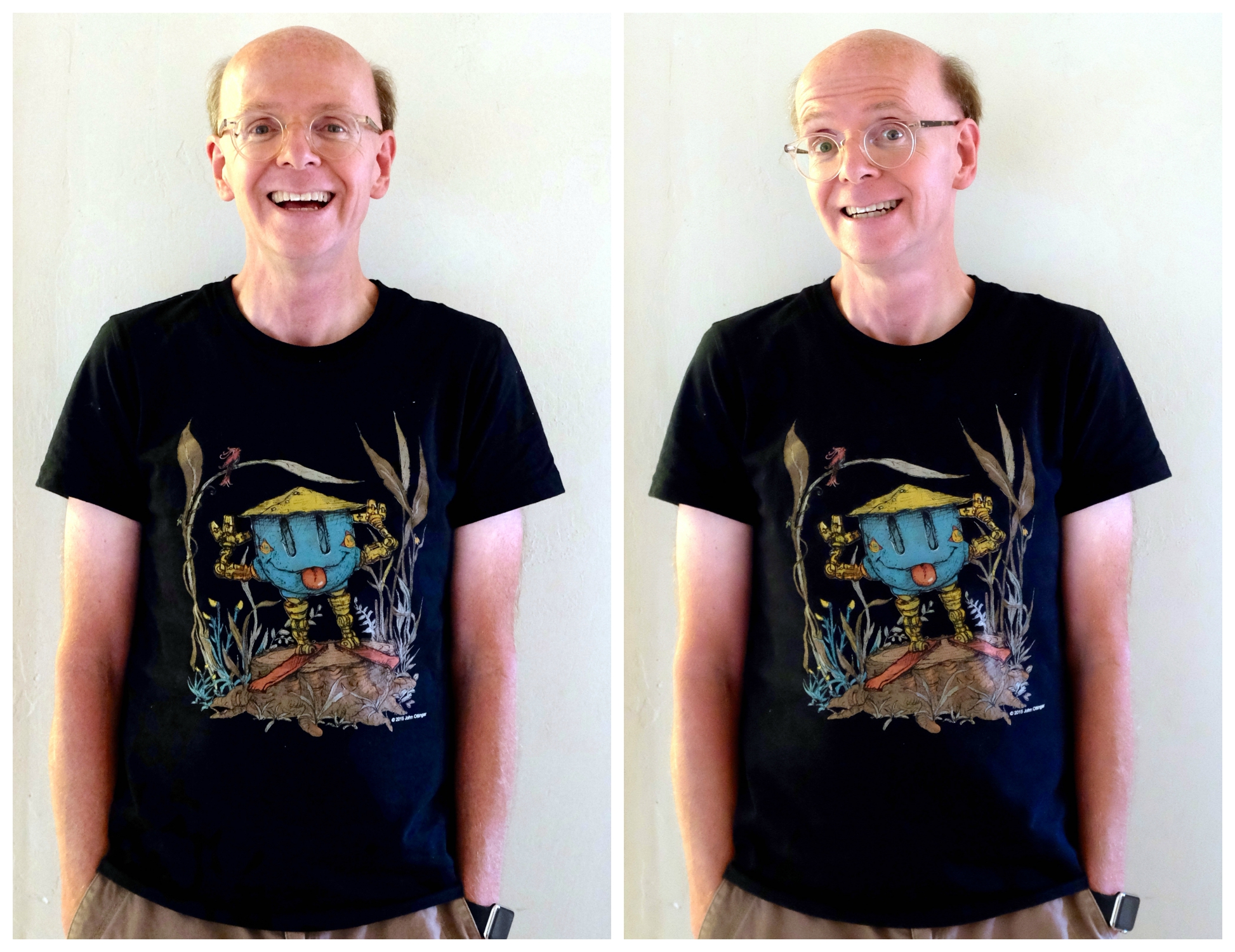I begin with a nod of thanks to my wife Anne for struggling with the Fuji X100T, which she handled for the first time yesterday, to shoot these photos of me and several others. We couldn’t go outdoors because of heavy thunderstorms, which are quite unusual for San Diego. Finding a good wall in the apartment with adequate ambient light proved difficult. I turned 56 one week earlier; these are the first pics at my new age.
You see me here at 131 pounds (59 kg). That’s down from 182 (82.6 kilos) when I cut my carb consumption by more than than 90 percent starting July 15, 2013. But my weight is up from 127, or by more than 2.2 kilos, since late June. The long decline reverses as I carb cheat. That behavior stops after today—not so much to lose weight but to be healthier. The massive weight loss is but a side benefit.
You could achieve the same result, but discipline is required. No pasta. No bread. No potatoes. No rice. No baked desserts. Treat wheat as pure poison. Carbohydrates convert into glucose in the bloodstream, stressing heart, kidneys, liver, and spleen. The excess turns to fat that later, when burned off, produces bad cholesterol. Discipline means eating few carbs or foods with added sugar. Freshly preparing your own food, rather than eating packaged or eating out, is a necessity.
The change isn’t dieting or self-starvation but adaptation. Eat protein-rich foods like meat. Bulk up leafy vegetables. Favor nuts and berries for snacks and as staples. Think of these foods, particularly proteins as time-released energy. Carbs flood the bloodstream with energy-producing glucose. Think flash flood. Protein is a slower-flowing, life-giving river.
Don’t cheat. No pies or cakes for birthdays, during the holidays, or to consume any time. If the family has spuds with supper, you treat them as duds. Your behavior must change completely.
I think of myself like an alcoholic. My obesity resulted from carb addiction: Pasta, my favorite. Breads, my next favorites. Treats, the worst favorites of all. As a carbaholic, my challenge is to stay sober from sweets and any food that primarily becomes glucose in the bloodstream. Like the alcoholic who must never touch a drop, the carbaholic can’t consume a crumb.
My Body Mass Index two years ago was 29.4, which is the high end of being overweight and just misses (by a fraction) being obese. Semantics! Obese I was! My BMI this morning: 21. Normal is between 18.5 and 24.9.
I didn’t diet. I didn’t start an exercise routine—although as my weight went down my activity went up, which is healthier. Natural.
Yesterday morning, I read BBC News story “Obesity: ‘Slim chance’ of return to normal weight“. I believe it. That was my lifestyle before massively purging carbs and unnecessary added sugars from my daily diet.
Giving up the foods you love is difficult. American foodstuffs are carb-rich and the portions served are typically too large. Habits don’t easily change, particularly when emotional satisfaction is high and memories associated with eating this or that, and with whom, are long and deep. Then there are social considerations—being the oddball when you don’t eat like everyone else. That’s one reason for my alcoholic reference. Social drinking isn’t that different from social eating.
Correction: It’s very different. Everyone eats every day, but not all of us consume alcohol. We grow up eating with family and friends. Food is very social. If not for my wife’s support, I would be an obesity statistic today, and someone compelled into an insulin routine.
Looking back two years later, I’m amazed. I started this journey because of a routine blood test showing overly-high glucose level in the blood. I didn’t set out on a weight-loss regime. But as the pounds shed with little exercise and my general feeling of energy grew, my resolve to stay the course strengthened.
Photo Credit: Anne Wilcox
